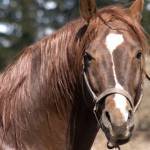Some Feed Supplements Not Effective in Relieving Headshaking in Horses

No one knows why some horses display headshaking behavior, but practically everyone who has owned a headshaker agrees it can be a significant problem that severely limits a horse’s usefulness. Headshakers differ in the degree to which they show the behavior. In horses that are only mildly affected, headshaking may be a minor annoyance, while other horses throw their heads so violently that it is dangerous to handle them and nearly impossible to ride them.
Occasional mild headshaking can be caused by flies, feed or hay stuck somewhere in the horse’s mouth, or a poorly fitted bridle or bit, to name a few factors. True headshaking behavior goes far beyond this type of nodding or shaking, but it wouldn’t hurt to check out these possibilities and correct any problems before labeling the horse a chronic headshaker.
Various causes of the behavior have been suggested: allergic reactions, problems related to vision, insects or growths causing ear inflammation, sunlight-triggered irritation of the trigeminal nerve, and others. It is possible that more than one factor may lead to headshaking, and this may be the reason that some suggested treatments are successful for one horse but not for another.
Dietary supplements such as melatonin and magnesium have been used on some headshakers. If a horse’s behavior is caused by a problem that these supplements can influence, the horse may show improvement, after which the owner may loudly preach the merits of the treatment to owners of other headshakers. The problem with this type of do-it-yourself dietary meddling is that some supplements can be harmful if intake becomes excessive. For example, too much magnesium can lead to irregular or slowed heart rate, respiratory problems, and depressed nervous system function. Owners who try dietary manipulation to fix headshaking may thus be putting their horses at risk for new health problems, often without relieving the initial behavior. For this reason, a complete veterinary examination is suggested for a headshaking horse before any treatment is begun, and the veterinarian should continue to monitor the horse if a feed supplement is included in treatment.
To evaluate the efficacy of one type of feed supplement designed to alleviate headshaking, researchers at the University of Liverpool in England carried out a trial using 32 horses that had previously been diagnosed with chronic headshaking for which no cause had been found. The horses were given the supplement for four weeks, had two weeks with no supplement, and then had four more weeks in which they were given a placebo. The horses were videotaped at rest and during exercise periods. The recordings were made before the treatments began and after each treatment. The tapes were reviewed by two veterinarians, and owners of the horses filled out a questionnaire to assess headshaking behavior as the study progressed. No significant differences were seen by the veterinarians or the owners between the two treatments. The research team concluded that the supplement provided no benefit towards alleviating headshaking. However, owners reported improvement in headshaking behavior during both the product trial and the placebo phase compared to behavior when no treatment was being given. This perception of improvement, known as the “placebo effect,” is attributed to the desire to see a positive result that can be linked to a particular treatment, especially if the treatment or product has been purchased for a high price.
A few take-home messages for owners of headshaking horses.
- Headshaking is difficult to treat in some horses. Consult a veterinarian, an equine nutritionist, or both before trying a dietary product or equipment change on your horse.
- Beware of product claims that seem too good to be true. Ask to see supporting evidence from clinical trials, and don’t expect a miraculous cure.
- Keep in mind that your desire to change your horse’s headshaking behavior may cloud your perception of the effect of a treatment. Keep a record of the horse’s behavior before, during, and after the use of any dietary supplement or change of equipment.
- True headshaking behavior is not simply a bad habit, but a response by the horse to pain or discomfort. Therefore, owner choices such as punishing the horse, using a tight tie-down strap, or changing to a more severe bit are unlikely to fix the problem.








